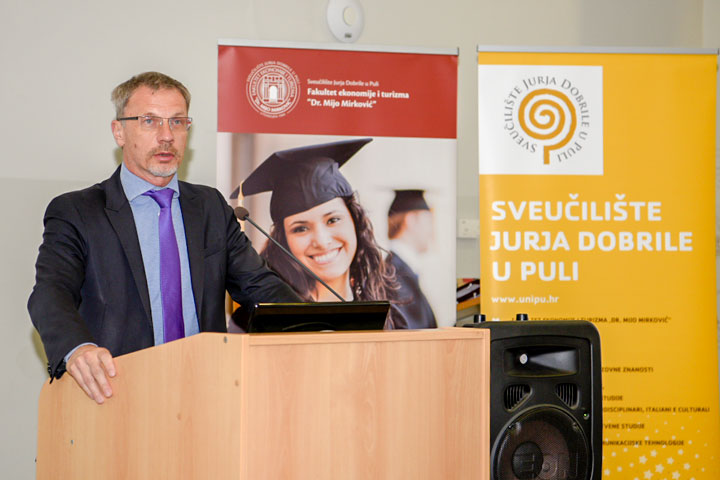
It is in Croatia's interest to initiate the process of the introduction of the euro as it would create significant and permanent benefits which largely outweigh the costs, noted Croatian National Bank Governor Boris Vujčić at today's presentation at the gathering "The introduction of the euro and economic growth in the Republic of Croatia - the challenges of the future", organised by the Faculty of Economics and Tourism "Dr. Mijo Mirković" in Pula.
Talking on the topic of recent economic developments, Governor Vujčić noted that, after a six-year recession, Croatia was witnessing economic recovery based on exports and personal consumption. Following Croatia's accession to the EU, goods and services exports grew dynamically, the fact reflected also in a gradual increase in Croatia's share in global exports, while internal and external imbalances were decreasing at a fast rate. The budget deficit is eliminated and public debt is on a downward path, while net foreign liabilities have been reduced by 30 percentage points since 2010. Despite its steady reduction, public debt remains high, making Croatia vulnerable; in case of borrowing terms worsening, budget expenditures for interest would rise considerably (HRK 3bn for each percentage point of increase). In addition, internationally comparable indices point to a number of structural weaknesses that are reflected in low productivity growth and slower real convergence.
Presenting the costs and benefits of the introduction of the euro in Croatia, the Governor said that the benefits would be permanent and the costs small and mostly one-off, noting that Croatia was the smallest member state of the European Union that still had its own currency. Also, in view of Croatia's high financial integration in the euro area, with a high 75% of domestic savings and 67% of total debt liabilities indexed to the euro, the country is highly exposed to currency risk. The transition to the euro would not only eliminate the currency risk for citizens, companies and the government, but would also lead to a reduction in interest rates and removal of the risk of currency crisis and a reduction in the banking and balance of payments crisis. The entry in the euro area would have a positive effect on foreign trade in goods and investments due to a reduction in transaction costs and currency conversion costs, and a greater transparency and easier price comparability. The introduction of the euro would also have a positive effect on tourism: 70% of total tourist revenues and 60% of total tourist nights in Croatia come from the euro area.
The loss of independent monetary policy would not have a significant negative impact on Croatia, explained the Governor, adding that high euroisation and the presence of the euro in the Croatian financial system narrow the space needed for conducting the monetary and exchange rate policy. The exchange rate is kept stable and may not be used as a tool for improving competitiveness. Contrary to public perception, the risk of price level growth due to conversion is generally very small; the impact of conversion on prices in new member states of the euro area stands at 0.23 percentage points on average, while the impact on the consumer price index in Croatia has been estimated at 0.2 percentage points.
The Governor stressed that the priority of economic policy during the introduction of the euro would be to ensure a further prudent fiscal policy aimed at a balanced budget, public debt reduction and a creation of a fiscal space for crisis periods (countercyclical activity). To increase potential growth, also needed are structural reforms such as a reduction of macroeconomic imbalances, achievement of sustainable economic growth and new jobs creation.
Participants in the panel discussion were, in addition to Governor Vujčić, Dragutin Pavletić, Director of Uljanik Plovidba and Danijel Petrović, Alumni of the Faculty of Economics and Tourism in Pula. The topics discussed included the costs and benefits of the introduction of the euro and Croatia's readiness to introduce the euro. The participants noted that transition to the euro was a process that Croatia committed to with its accession to the EU.
The introduction of the euro is a worthy process and the only justifiable solution over a long-term, noted Dragutin Pavletić, who also voiced his concern about the implementation of structural reforms in Croatia, in particular the reform of the judiciary. Danijel Petrović pointed to the examples of other countries that had reaped multiple benefits from the entry in the euro area, noting that on its path towards the introduction of the euro, Croatia should look to and learn from other countries that had replaced their national currencies with the euro.
